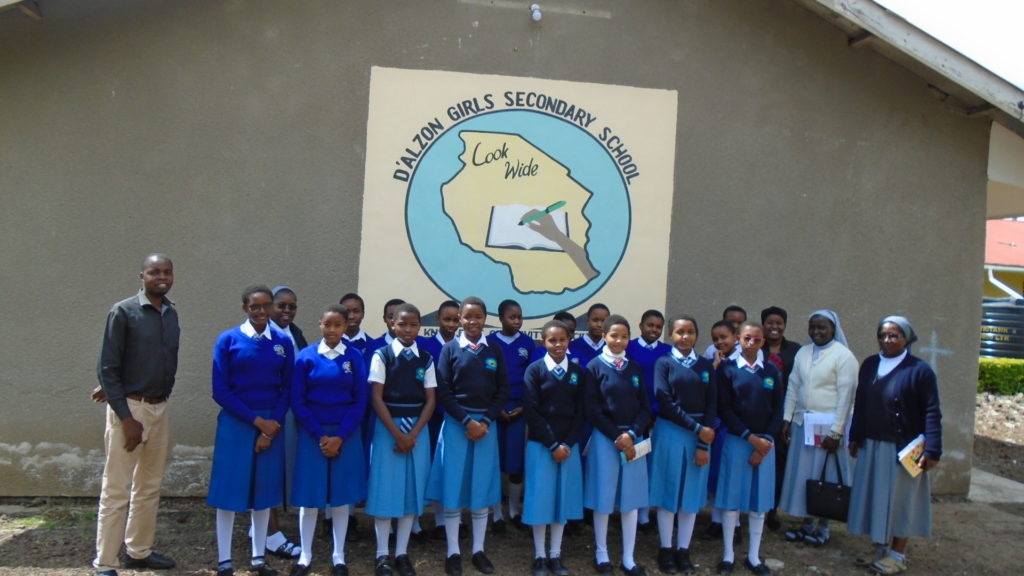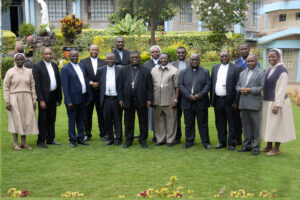KENYA: Association of Consecrated Women launches Catholic Sisters into Business World

Students who participate in the poultry project
By Sr. Grace Candiru, MSMMC
Three years into implementation of ACWECA’s sustainability project dubbed the Sisters Blended Value Project, more congregations in the region are translating this shared vision to congregational financial sustainability and development.
The project which is aimed at making Sisters’ ministries sustainable, takes identified congregations through entrepreneurial skills training to enable them turn their social ministries into social enterprises in line with their charism and mission.
The Association does this in partnership with the Miller Center for Social Entrepreneurship of Santa Clara University of the USA and it locally identified social enterprises that train and mentor participating congregation with the skills of enterprise development.
One such Congregation that has come on board is the Oblate Sisters of Assumption in Arusha, Tanzania. Since the congregation’s entry point to the project was their school, D’Alzon Girls’ Secondary, the students and the teachers became the first adapters.
According the Head Teacher Sr. Julia Kisanga, the students, teachers and the Sisters involved in the project were guided by Teach-a-Man-to-Fish, a local social enterprise that was contracted to engage with them. They underwent entrepreneurship skills straining, guidance and mentorship, all of which done either on site or online through zoom conferencing.
Before introducing the project to the students, the Congregation’s leadership team briefed the School’s Board and later the parents who challenged the school management to make it part of the school’s programme.
Next, the participating students with the guidance of the participating teachers went on to develop a business plan as part of the school enterprise challenge awards programme – Bronze level administered by Teach-A-Man-to-Fish.
The school then set up a poultry farm with one hundred chickens. This was after the students carried out a market research, where they were able to identify their competitors and their target market. This helped them to discover their competitive advantage.
Sister Kisanga who also doubles as the Vice Provincial of the East African Province said the participating students are enthusiastic about the project. She said the students use their private time in following up the activities of the project. Two of the teachers in the school also joined the project besides the sisters.
Despite their involvement in the project, Sr. Kisanga said the students’ performance has not been affected. “They are among the active students in the school and you can’t tell them the same thing twice,” she said.
Mr. Kigongo N. Masalu, a teacher participating in the programme said they are active in class and other extra-curricular activities. “They have a sense of responsibility and are high academic performers,” he added.
Another teacher, Ms Sophia S. Mgonja recalls that one parent once asked her what the school had done to her daughter. According to her, the daughter was never keen about farming or engaging in other activities without being told. This has however changed and that she was now the first to go to the field and clean the compound, among other responsibilities.
Meanwhile Glory Loma a student who is the project manager said instead of just depending on her academic knowledge, the skills she has learnt from this project would come very handy while Peace Peterson another student said she would use the skills she has gained to set up her own business. Another student who has started a poultry farm with the help of her parents said they never used to keep any animals or birds, but that it was now an added income to her family.
Sr. Virginia Pia Mwasu, the team leader for the project in her congregation was appreciative of the impact the project is making in the lives of the students. She said the students were already blending their academic knowledge with the life skills they have acquired.
“The students who are studying book keeping are using their knowledge to keep accounts of the project while those who are studying biology are keeping an eye on possible diseases that may affect the birds,” she said proudly.
These skills are being augmented with the skills of poultry keeping the Sisters gained from Eggpreneur, another social enterprise ACWECA contracted to engage them. The sisters have also joined other poultry farmers through Facebook.
One invaluable knowledge the sisters learnt from one of their partners is to feed the birds on pumpkin leaves as a substitute for artificial vitamins. They also learnt to observe the routine of the birds and are able to tell if a bird getting sick, and administer treatment immediately. This has helped to keep the birds safe, healthy and productive.
For the Provincial of the Oblates of the Assumption Sisters, Sr. Leah Kavugho, the project could not have come at a better time. “We have always thought of what we could do more for our students than just academics and that propelled us to take on the SBVP,” she said and added, “We want to create a society of job creators not job seekers.”

The Sisters have also included an aspect of environmental protection in the training of the girls in their school. The girls are involved in tree planting and taking care of the trees already planted at the school and the nearby environs.
According to Sr. Kavugho, the girls are building on what her Congregation is already doing. She explained that environmental protection is at the core of their ministries and that her Congregation was in the process of creating a commission to protect the environment, noting that the two would now work together.
Among the projects the Sisters are implementing is the keeping of Friesian cows whose waste is being used to produce biogas for cooking at the novitiate. The DR-Congo born nun however explained that the setting up of the system came under the initiative of the government where beneficiaries were encouraged to avoid cutting of trees.
She said the Tanzanian government helped families/communities rearing animals to construct the system with some contribution from the beneficiaries. She said the system is able to produce enough gas for cooking in the Novitiate.
According to Sr. Virginia, the skills her team has acquired are being spread to other communities for the sustainability of their ministries. At the side of the Sisters, all their communities had poultry but these were for their consumption.
The Provincial House which also doubles as the formation house is already keeping 300 chickens, pigs, rabbits and cows. But unlike in the past where the sisters simply consumed whatever they produced, this time round, they buy them. The money from the sales is being used to grow the enterprise.
The Sisters have also introduced the same skills in their postulate and novitiate, formation houses, and Sr. Virginia sees this as a way of sustaining the project in the congregation. At the postulate where they keep chickens and rabbits, a Sister is paired with a postulant and they work together for a period before being assigned to other duties. This helps everyone to get the skills and be involved.
The nun explained that all of them who are spearheading the project have their professional skills with graduate degrees.
“We need to inculcate in our people including the Sisters that we are all not going to be teachers, nurses or doctors. The Coronavirus has taught us that these professions can fail to put food on our plates, and so we need life skills too in order to survive,” she said.


